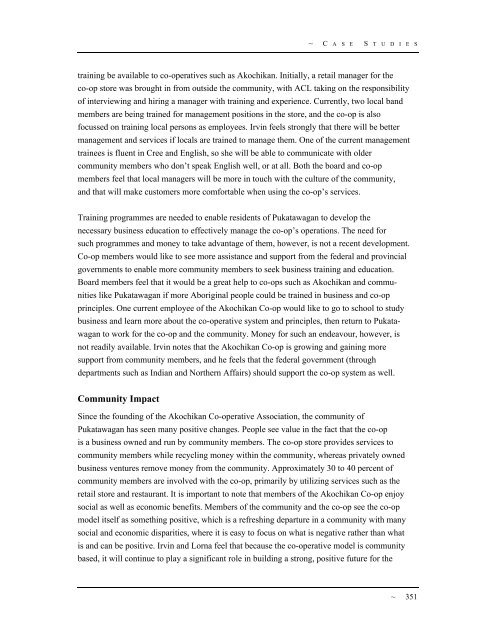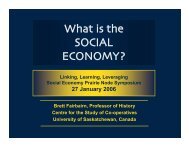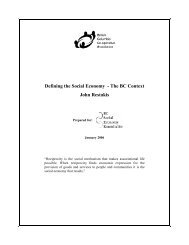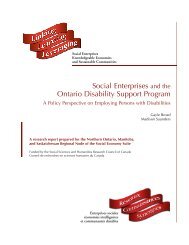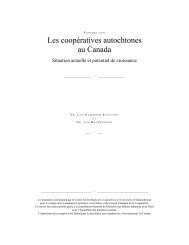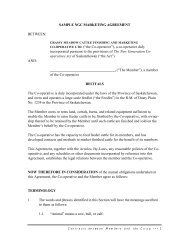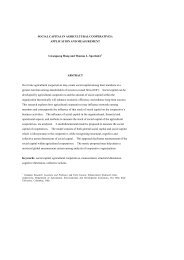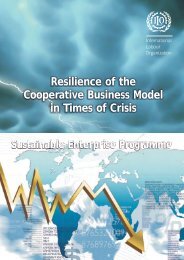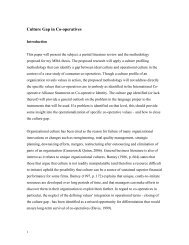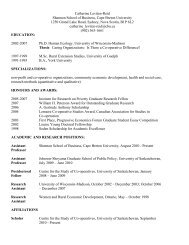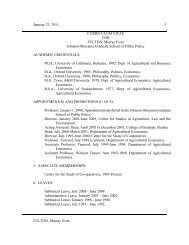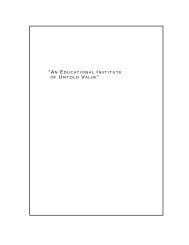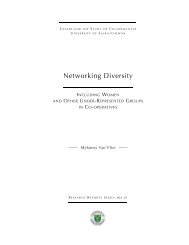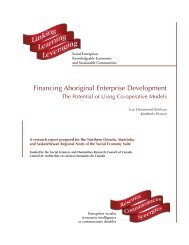Aboriginal Co-operatives in Canada - Centre for the Study of Co ...
Aboriginal Co-operatives in Canada - Centre for the Study of Co ...
Aboriginal Co-operatives in Canada - Centre for the Study of Co ...
Create successful ePaper yourself
Turn your PDF publications into a flip-book with our unique Google optimized e-Paper software.
~ C A S E S T U D I E Stra<strong>in</strong><strong>in</strong>g be available to co-<strong>operatives</strong> such as Akochikan. Initially, a retail manager <strong>for</strong> <strong>the</strong>co-op store was brought <strong>in</strong> from outside <strong>the</strong> community, with ACL tak<strong>in</strong>g on <strong>the</strong> responsibility<strong>of</strong> <strong>in</strong>terview<strong>in</strong>g and hir<strong>in</strong>g a manager with tra<strong>in</strong><strong>in</strong>g and experience. Currently, two local bandmembers are be<strong>in</strong>g tra<strong>in</strong>ed <strong>for</strong> management positions <strong>in</strong> <strong>the</strong> store, and <strong>the</strong> co-op is als<strong>of</strong>ocussed on tra<strong>in</strong><strong>in</strong>g local persons as employees. Irv<strong>in</strong> feels strongly that <strong>the</strong>re will be bettermanagement and services if locals are tra<strong>in</strong>ed to manage <strong>the</strong>m. One <strong>of</strong> <strong>the</strong> current managementtra<strong>in</strong>ees is fluent <strong>in</strong> Cree and English, so she will be able to communicate with oldercommunity members who don’t speak English well, or at all. Both <strong>the</strong> board and co-opmembers feel that local managers will be more <strong>in</strong> touch with <strong>the</strong> culture <strong>of</strong> <strong>the</strong> community,and that will make customers more com<strong>for</strong>table when us<strong>in</strong>g <strong>the</strong> co-op’s services.Tra<strong>in</strong><strong>in</strong>g programmes are needed to enable residents <strong>of</strong> Pukatawagan to develop <strong>the</strong>necessary bus<strong>in</strong>ess education to effectively manage <strong>the</strong> co-op’s operations. The need <strong>for</strong>such programmes and money to take advantage <strong>of</strong> <strong>the</strong>m, however, is not a recent development.<strong>Co</strong>-op members would like to see more assistance and support from <strong>the</strong> federal and prov<strong>in</strong>cialgovernments to enable more community members to seek bus<strong>in</strong>ess tra<strong>in</strong><strong>in</strong>g and education.Board members feel that it would be a great help to co-ops such as Akochikan and communitieslike Pukatawagan if more <strong>Aborig<strong>in</strong>al</strong> people could be tra<strong>in</strong>ed <strong>in</strong> bus<strong>in</strong>ess and co-oppr<strong>in</strong>ciples. One current employee <strong>of</strong> <strong>the</strong> Akochikan <strong>Co</strong>-op would like to go to school to studybus<strong>in</strong>ess and learn more about <strong>the</strong> co-operative system and pr<strong>in</strong>ciples, <strong>the</strong>n return to Pukatawaganto work <strong>for</strong> <strong>the</strong> co-op and <strong>the</strong> community. Money <strong>for</strong> such an endeavour, however, isnot readily available. Irv<strong>in</strong> notes that <strong>the</strong> Akochikan <strong>Co</strong>-op is grow<strong>in</strong>g and ga<strong>in</strong><strong>in</strong>g moresupport from community members, and he feels that <strong>the</strong> federal government (throughdepartments such as Indian and Nor<strong>the</strong>rn Affairs) should support <strong>the</strong> co-op system as well.<strong>Co</strong>mmunity ImpactS<strong>in</strong>ce <strong>the</strong> found<strong>in</strong>g <strong>of</strong> <strong>the</strong> Akochikan <strong>Co</strong>-operative Association, <strong>the</strong> community <strong>of</strong>Pukatawagan has seen many positive changes. People see value <strong>in</strong> <strong>the</strong> fact that <strong>the</strong> co-opis a bus<strong>in</strong>ess owned and run by community members. The co-op store provides services tocommunity members while recycl<strong>in</strong>g money with<strong>in</strong> <strong>the</strong> community, whereas privately ownedbus<strong>in</strong>ess ventures remove money from <strong>the</strong> community. Approximately 30 to 40 percent <strong>of</strong>community members are <strong>in</strong>volved with <strong>the</strong> co-op, primarily by utiliz<strong>in</strong>g services such as <strong>the</strong>retail store and restaurant. It is important to note that members <strong>of</strong> <strong>the</strong> Akochikan <strong>Co</strong>-op enjoysocial as well as economic benefits. Members <strong>of</strong> <strong>the</strong> community and <strong>the</strong> co-op see <strong>the</strong> co-opmodel itself as someth<strong>in</strong>g positive, which is a refresh<strong>in</strong>g departure <strong>in</strong> a community with manysocial and economic disparities, where it is easy to focus on what is negative ra<strong>the</strong>r than whatis and can be positive. Irv<strong>in</strong> and Lorna feel that because <strong>the</strong> co-operative model is communitybased, it will cont<strong>in</strong>ue to play a significant role <strong>in</strong> build<strong>in</strong>g a strong, positive future <strong>for</strong> <strong>the</strong>~ 351


